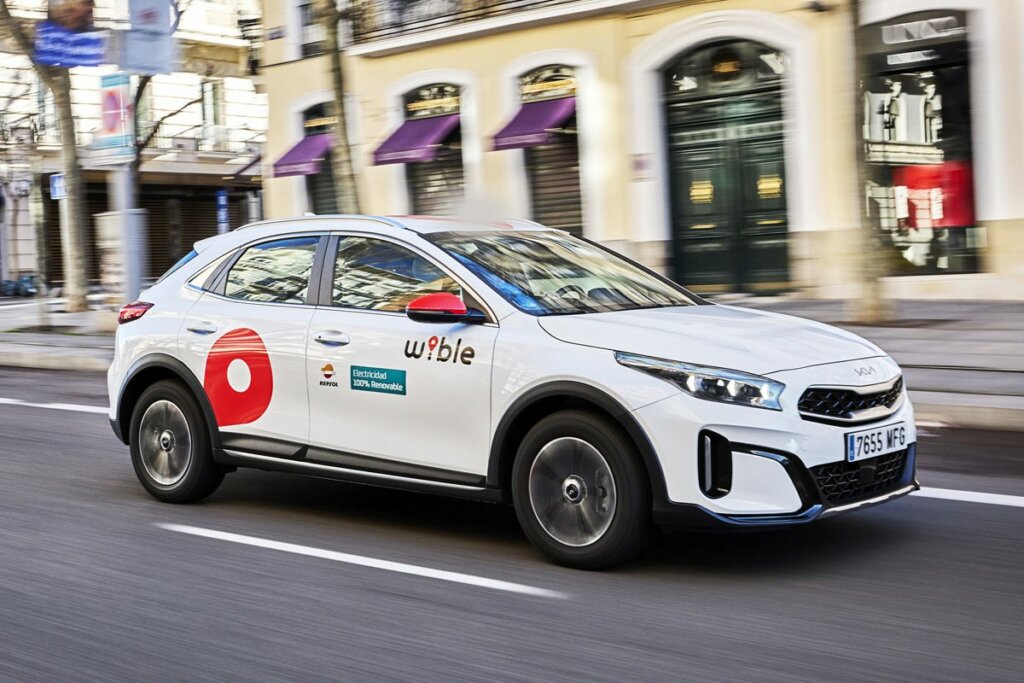As the year comes to a close, it’s time to explore the trends that I predict will shape the shared mobility landscape in 2024.
1. Car subscription models continue on an upward trajectory
Car subscription models are an attractive offer for consumers and the automotive retail market alike. They allow a growing population of consumers who prefer a usership model over an ownership one to enjoy flexible and convenient car access. For OEMs and auto dealers, it opens a new, significant customer base while increasing the lifecycle value of their vehicles.
The money is rolling in
Car subscriptions came roaring onto the scene in 2023 thanks to multiple large-scale investments. We saw the Spanish B2C provider Revel raise $123 million in equity investment, the B2C and B2B Swiss platform Carvolution secure €25 million for growth and fleet expansion, and the B2C and B2B Germany-based FINN raise an additional debt funding of around €25 million.
The magic formula

Kia’s mobility service WiBLE offers car subscriptions alongside carsharing
To maximize the benefits of a car subscription service, I’d like to share three pieces of advice drawn from my observations over the past year:
-
- Offer B2B: Subscriptions in the B2B market hold serious potential as fleet utilization optimization saves costs for companies by adapting to fluctuating needs.
- Incorporate used cars into the fleet: Integrating used cars into a car subscription fleet helps sidestep the swift depreciation of new vehicles, thereby enhancing their overall lifetime value.
- Offer other mobility services: Additional services such digital rentals and carsharing make the most of fleet optimization. For instance, Kia’s carsharing service Wible has added a popular subscription offer, Mas por Mes, and Sumitomo’s Aimo Share, is expanding its subscription program, alongside its carsharing offer.
- Be like Netflix: Subscriptions should offer maximum flexibility, allowing users to subscribe or cancel at their convenience. While it may seem counterintuitive, this approach fosters a more engaged and loyal customer base.
The final word on car subscriptions
Now that the money is in, the market is picking up speed, any persisting car subscription myths have been debunked, and there is a roadmap to success, car subscription models are set to see huge growth in 2024. Also, keep your eye on the growing Vehicle as a Service market, where car subscriptions, digital rentals, and carsharing are key components
2. The age of profitability has arrived (for those who heed our advice)
At the beginning of the year, I published 3 shared mobility lessons learned from the past year to thrive in 2023, in which I advised shared mobility operators to adopt the virtues of being lean. Now entering 2024, we have a clearer view of the impacts of having a heavy vs lean structure and what this means going forward
First, a success story

Leo&Go carsharing achieved profitability in less than 2 years
Our Mobility Showcase, Leo&Go carsharing, achieved profitability in just 21 months, in large part thanks to its lean operations. By leveraging Vulog’s top-notch software solution to enhance operations and manage a fleet of 400 vehicles, Leo&Go’s team of only five employees was able to reach break-even at a record pace. As a result, the service is now expanding its fleet, diversifying its offerings, and maintaining a customer satisfaction rate of 4.6 out of 5.
Now, some failures
Unfortunately, 2023 has also brought financial hardships for a spate of operators, particularly in micromobility. Shared e-scooter operators Tier recently laid off 22% of its staff, while Bird was delisted from the New York Stock Exchange. GoSharing, a Dutch moped operator, declared bankruptcy at the beginning of the year and the paris-based Cityscoot moped service has run into financial trouble. What do all of these companies have in common? They had a heavy cost structure, developing their house in-tech and, for most of them, seeking growth at any cost.
The final word on profitability
2024 is going to see more un-lean operators fall by the wayside – especially as interest rates remain high and VC funding dries up – while those operators who have adopted lean practices are in for a potentially very rewarding year.
3. Parking takes center stage
Parking has traditionally never been the sexiest of topics, but it entered the conversation in a big way in 2023 and will remain an important touch point in 2024. Recent studies have shown the importance of ample parking for carsharing fleets as not only do they encourage greater use of these services, but also bring social benefits to local communities and save cities money. What kinds of opportunities does parking hold for shared mobility operators in 2024?
Out with the private and in with the shared

Cities such as Paris are eliminating private parking in favor of bike lanes and pedestrian zones
Cities around the world are increasing efforts to reduce private vehicles on their streets. One such strategy is to offer spaces exclusively for shared cars, as we are seeing in Copenhagen, Budapest, and New York City. Many cities are also eliminating parking spaces to implement bike lanes, and pedestrian zones, which has been shown to lead to a decrease in private car traffic and an increase in the adoption of shared mobility services. Heading into 2024, I envision cities eliminating even more street parking for private cars, setting the stage for a substantial uptick in shared mobility usage.
Real estate enters the game
In 2023, we started to see many North American cities cast off long-standing parking minimums for residential and commercial buildings. No longer required to provide around one parking space per apartment or one per 300 square feet of commercial development, real estate companies are starting to turn to shared mobility services, such as private carshare fleets, as an attractive perk for building residents. California-based Autonomy’s new carsharing service caters to luxury properties, EV platform Envoy has partnered with a New Jersey residential community to provide a fleet of Teslas and Canadian Kite Mobility secured $3.5 million for shared e-mobility in residential buildings. Our own Leo&Go recently inked a deal with a French real estate developer to provide a fleet of 6 electric car-sharing vehicles for their next large-scale project.
The final word on parking
Having adequate parking can make or break a shared mobility service and many cities are waking up to the fact that they contain simply too much of it overall. Fortunately, this will help, not hurt, operators who provide the type of sustainable, accessible, and cost-saving alternative to private cars that cities are craving.
Why 2024 needs to be a year of sustainable mobility

Transport accounts for around one-fifth of global CO2 emissions according to the International Energy Agency
In late November, climate scientists raised concerns as the world briefly surpassed the 2-degree warming limit for the first time. Every year that passes by without a significant reduction in CO2 makes it increasingly challenging to mitigate the long-term impacts of climate change. Mobility is one sector in which we can make an impactful change. If in 2024 we see a steady rise of usership over ownership, sustainable mobility companies find financial success, and cities dramatically reduce private cars in favor of shared mobility services, it could prove to be a truly remarkable year.




